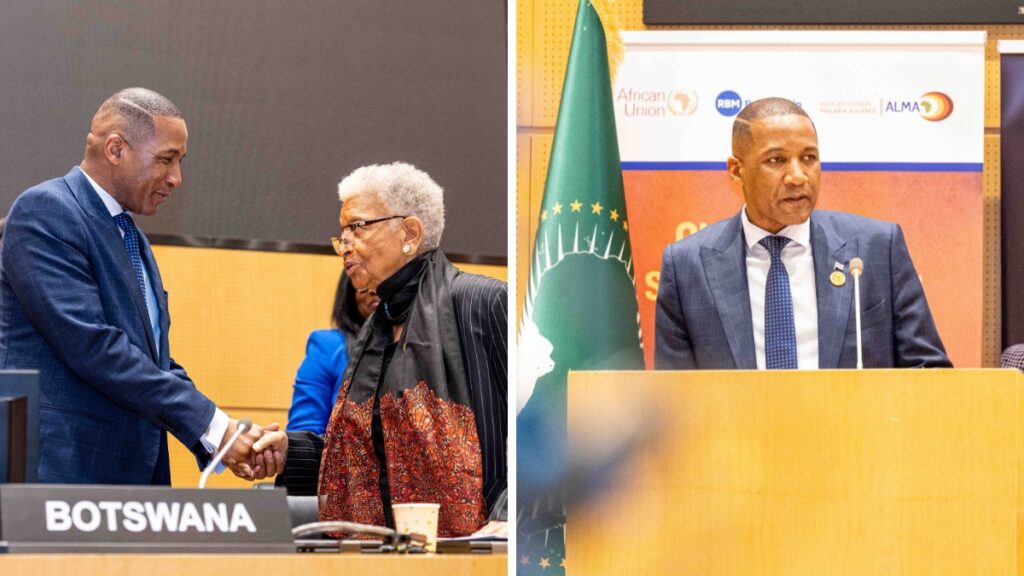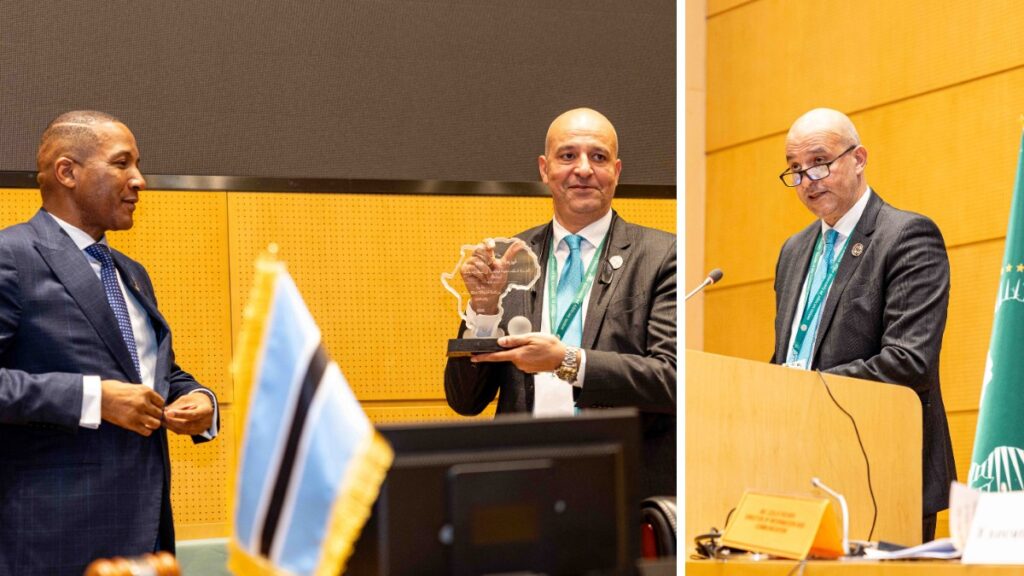ALMA news from the 38th African Union Summit
African leaders appoint a new ALMA Chair President Advocate Duma Gideon Boko of Botswana; taking over from HE President Umaro Sissoco Embaló of Guinea Bissau; and commit to Change the Story on malaria and demand a big push to achieve malaria elimination including a successful Global Fund replenishment.
Addis Ababa, 16 February 2025 – Against the backdrop of the 2024 Africa Malaria Progress Report, which reveals stagnating progress and mounting threats to malaria elimination across the continent, Heads of State and Government at the African Union Summit committed to mobilising domestic resources and scaling up integrated and innovative financing. Leaders also urged global partners to recommit to the fight against malaria through the replenishment of the Global Fund to Fight AIDS, Tuberculosis and Malaria.
As a new chair takes over the helm of ALMA; African leaders underscored the need for a unified and decisive response. This call to action was supported by the launch of a new stage of the ‘Change the Story’ campaign, which amplifies children’s stories of how malaria has impacted their lives.
The ‘perfect storm’ threatens to reverse decades of progress
Released at the Summit, the 2024 ‘Africa Malaria Progress Report’ paints a picture of a defining moment in Africa’s fight against malaria, showing that progress continues to stagnate leaving Africa’s ambitious goal to eliminate malaria by 2030 in jeopardy. The report warns that malaria elimination in Africa is facing serious threats including insufficient resources, rapid population growth, climate change, biological resistance including insecticide and drug resistance, and the devastating impacts of humanitarian crises. Together, these factors create a ‘perfect storm’, which threatens to reverse decades of progress, making the fight against malaria harder. Leaders underscored that lifting the continent out of this storm will require intensified resource mobilisation, including through innovative financing, domestic resource mobilisation and rapid introduction and scale up of new interventions and commodities.
H.E. President Embaló hands over ALMA chairmanship to President Advocate Duma Gideon Boko, of the Republic of Botswana

Concluding his tenure as Chair of the ALMA after more than two years of strong leadership in malaria advocacy across the continent, H.E. President Umaro Sissoco Embaló of Guinea-Bissau officially handed over Chairmanship to President Advocate Duma Gideon Boko who pledged to continue advancing the malaria elimination agenda while emphasising the importance of prioritising increased resources across the board to prevent a catastrophic resurgence and put progress towards malaria elimination back on track.
Africa must urgently rise to the challenge by mobilizing domestic resources, including by drawing down on the resources in our emergency funds and increasing our health budget allocations. We must also scale up innovative financing including through End Malaria Councils and Funds, and leverage platforms like World Bank IDA and the Green Climate Fund to ensure that our national programmes are fully equipped to drive the malaria agenda forward.
President Advocate Duma Gideon Boko, President of the Republic of Botswana and ALMA chair
Her Excellency Ellen Johnson Sirleaf, former President of the Republic of Liberia and a former Chair of ALMA, played a key role in the handover process at the African Union Summit. Her Excellency also noted that nine End Malaria Councils have since been established, and have collectively raised over $125 million in the fight against malaria.
These multisectoral councils also promote primary health care including through the engagement of community health workers. These Community Health Workers are crucial in the fight against many diseases including malaria, diarrhoea and pneumonia, are pivotal to primary health care and must be scaled up.
H.E. Ellen Johnson Sirleaf, former President of the Republic of Liberia and a former Chair of ALMA
A successful Global Fund replenishment is vital to get back on track for elimination
Malaria is a pathfinder for health systems strengthening, primary healthcare, and pandemic preparedness, and it exemplifies the pressing need to address the health impacts of climate change. This is why we must ensure sufficient resources to address malaria, HIV and TB and strengthen health systems, especially in the upcoming Global Fund replenishment.
H.E. Ambassador Minata Samate Cessouma, the Commissioner for Health, Humanitarian Affairs, and Social Development at the African Union Commission
The Global Fund is the largest source of funding for malaria, providing 62% of all international financing for malaria programmes. It is therefore essential that the Global Fund replenishment this year is successful.
The report further highlights the urgency of scaling up next-generation tools, including dual insecticide-treated nets, new insecticides, new malaria medicines, and malaria vaccines. To this end, leaders called for the fast-tracking of these interventions and ensuring that they are deployed to address the growing challenge of biological resistance. Manufacturing this tools locally, in Africa, can drive economic growth while also advancing public health outcomes.
Change the Story: A new campaign to galvanise action and drive increased political will and investment
Also taking place at the summit was the premiere of a new film as part of the latest stage of the international ‘Change the Story’ campaign. Children are the most vulnerable to malaria and yet their voices often go unheard. This campaign captures powerful stories from children on malaria’s impact on their lives, highlighting the human cost of the disease, underscoring the urgent need for action including increased investment in malaria elimination.
The campaign encourages leaders to support this year’s critical replenishment of funding into the Global Fund. It also provides a platform for malaria endemic countries to take further action to accelerate malaria reduction, including increasing domestic investment to tackle the disease.
The campaign’s latest stage is backed by high profile campaign supporters including Zero Malaria Ambassador, Chimamanda Ngozi Adichie who urged:
We need to listen to children’s voices today as the decisions our leaders make will determine their futures tomorrow. Nigeria, where I was born, carries the greatest burden of malaria, so I know first-hand how this disease can stunt children’s educations, steal their livelihoods and sometimes take their lives. This is why we urgently need to change the story of malaria. Leaders must turn the page and start a new, more hopeful chapter to save lives.
Chimamanda Ngozi Adichie
Through the new campaign film, we learn about the devastating impact of severe flooding in Mozambique, through the compelling story of a young girl, Gloria, who lives in Boane:
I remember when the sky got really angry. The rain came down so hard it was like elephants dancing on the roof. The roof flew away and the house started to fill with water. Our house was gone, the greedy water took it all – our beds, our mosquito nets and my favourite toy. We ran to school to hide. It was the scariest time of my life.
Gloria from Boane, Mozambique
Celebrating Egypt’s malaria-free certification by WHO

Amid persisting challenges in the fight against malaria, Egypt’s malaria-free certification marked a notable milestone in 2024. During the press conference President Advocate Duma Gideon Boko; and Dr. Chikwe Ihekweazu, WHO Assistant Director General and Acting WHO Regional Director of the World Health Organization Regional Office for Africa (WHO AFRO), presented Ambassador Ashraf Sweilam, Assistant Minister of Foreign Affairs for African Organizations and Communities for the Arab Republic of Egypt, and Personal Representative of the President of the Arab Republic of Egypt to AUDA-NEPAD, with an award in recognition of this achievement, noting that victory against malaria is attainable.
Lasting progress is attainable with full commitment
According to the 2024 Africa Malaria Progress Report, there has been a 38% reduction in malaria incidence and a 60% reduction in mortality since 2000, preventing 1.8 billion cases and saving 11.9 million lives in Africa over the past two decades. This progress illustrates that despite pressing challenges, lasting progress against malaria is attainable with full commitment. In his remarks, H.E. President Umaro Sissoco Embaló reminded leaders, policymakers, and partners of the critical need to act now and support a big push. Now is the time to accelerate the continent to malaria elimination.
Access the 2024 AU Malaria report.
Related content
2024 Africa Malaria Progress Report
Read the Africa Malaria Progress Report for 2024 which was presented at the 38th African Union Summit.
Quarter 4, 2024: ALMA scorecard, Africa malaria progress report and country-specific reports
ALMA scorecard, Africa malaria progress report and country-specific reports for October to December 2024.